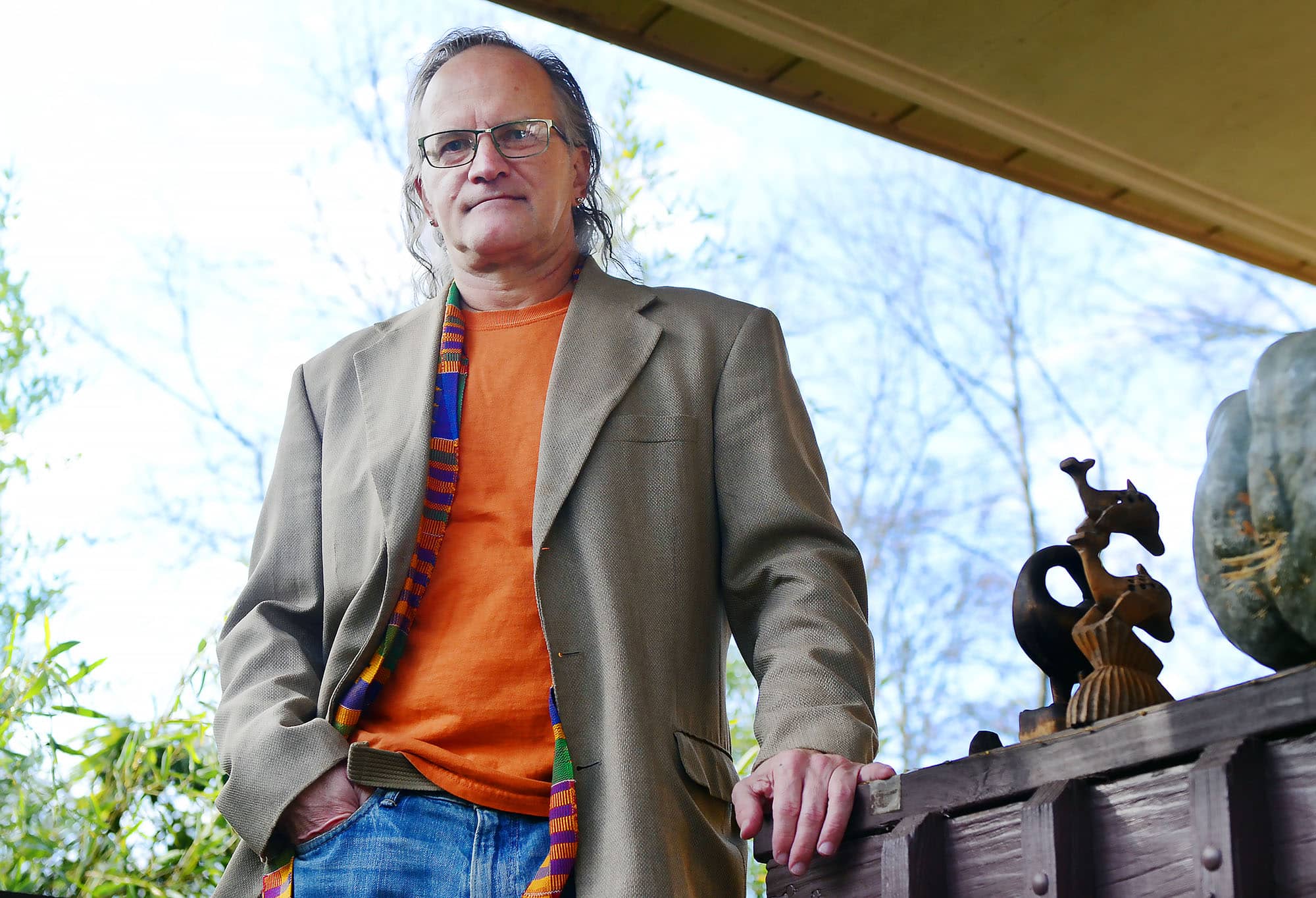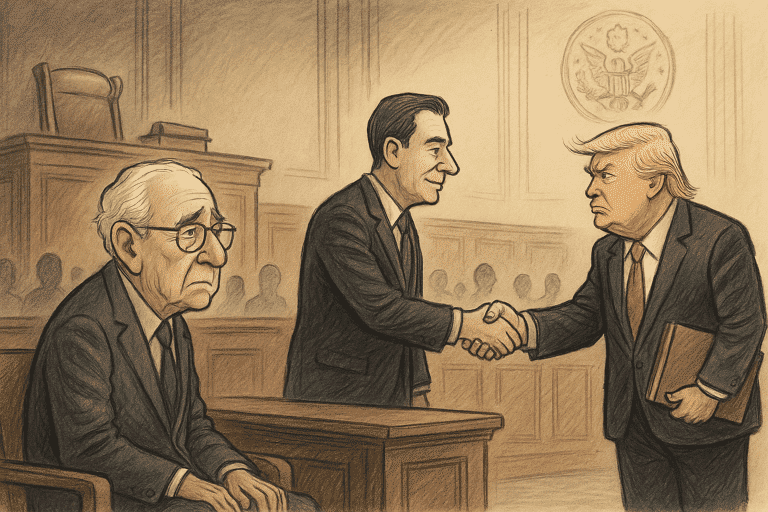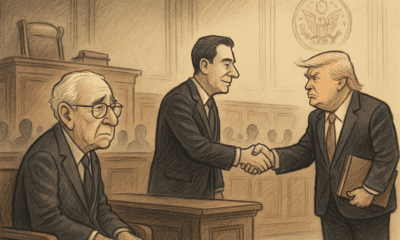Mississippi Today
Amid crackdown on universities, Millsaps prof’s job in flux

Amid a national maelstrom of attacks on academic freedom, the fate of James Bowley, the former chair and professor of Religious Studies at Millsaps College, hinges on a 10-word email he sent to his class of three students the morning after the presidential election. Nearly a month after a grievance committee repudiated his subsequent termination over those 10 words, his status remains in flux.
The day following his email, Bowley found out that he had been placed on paid administrative leave pending a review of his use of a Millsaps email account “to share personal opinions” with his students.
Around the days of the election, racist messages targeting African American students had been sent using the anonymous campus messaging platform Yik Yak. The FBI had informed the Millsaps community via email that it, along with law enforcement and the U.S. Department of Homeland Security, was investigating those messages.
“I personally would not send that kind of content to my class. But I understand the disappointment behind the email, understand the human sympathy, especially what happened with the Yik Yak post,” said David Wood, chair of the Modern Languages department at Millsaps College, referring to racist and threatening messages directed at African American students on the anonymous messaging platform Yik Yak, around the days of the 2024 presidential election.
“I knew the students were fearful. So I canceled my class,” Bowley said. “And I do not regret that for a second.” His 10-word email explained why the class was being cancelled: “to mourn and process this racist fascist country.”
Bowley filed a grievance against his leave of absence with the university’s grievance committee, which could not identify any specific policy that he had violated. It recommended in December that Bowley be reinstated immediately; that the Interim provost issue a formal apology to him, and that he be compensated for a loss of income that arose from his removal from a study abroad course he was supposed to have taught.
Weeks later, Bowley’s employment was terminated, by the interim provost — a decision he appealed. The interim provost at the time, Stephanie Rolph, was a candidate for the full-time position.
Now, nearly a month after the grievance committee decided to allow the terms of Bowley’s reinstatement be negotiated, his employment remains in flux as he waits for Millsaps’ president to affirm or overrule their decision.
The purpose of the college’s action “is to demonstrate the power of the administration over the faculty,” Bowley said. “I think the whole point is to make faculty self censor.”
The termination of Bowley comes amid a nationwide crackdown by universities and the Trump administration on speech by students and faculty. Since 2023, dozens of faculty members have been disciplined, or even fired. Since March, more than 1,500 international students have seen their visas revoked, with some even being detained without due process. And top universities have seen threats of funding freezes if they do not agree to laundry lists of demands and restrictions.
On Monday, Harvard University, which has vowed not to “surrender its independence or constitutional rights,” sued the Trump administration in an attempt to block them from freezing $2.2 billion in federal funding and an additional $1 billion in grants, which the administration in a letter had said it would do if the university did not overhaul its admissions and hiring policies, among others, allow for federal oversight of its operations, and commission external audits of a number of departments.
This letter, which the Trump administration now says was sent in error, came about a month after Columbia University capitulated to similar demands by the administration – in its case, which included empowering campus security to make arrests, suspending students involved in protests last spring, and placing its department of Middle Eastern, South Asian and African Studies under administrative receivership.
On Tuesday, the American Association of Colleges and Universities, which has more than 800 member institutions, issued a public statement, condemning “undue government intrusion in the lives of those who learn, live, and work on our campuses” and “coercive use of public research funding.”
Nearly 200 leaders of educational institutions signed the statement, including Millsaps College – the only Mississippi institution to do so. The president of Columbia University did not.

“Millsaps promises free speech to its faculty members and when it makes a promise like that it should stand by that promise and protect it,” said Haley Gluhanich, senior program counsel of FIRE, the Foundation for Individual Rights in Education. In Bowley’s case, she said, “We saw these violations of fundamental due process rights – the fact that he was put on administrative leave before he even had a hearing.”
Millsaps’ Faculty Handbook says a faculty member is “entitled to freedom in the classroom in discussing the subject matter of the course, but should be careful not to introduce controversial matter which has no relation to the subject.” It elaborates that “when speaking or writing as a citizen, the teacher is free from institutional censorship or discipline, but this special position in the community imposes special obligations,” because the public may interpret the words of a faculty member as being representative of the position of the institution.
However, in the grievance committee’s December recommendation, it found that the handbook “does not offer guidance on how to distinguish personnel matters from matters of academic freedom,” and that this lack of clarity appeared to expose tenured faculty members to a disciplinary process that was subject to the sole decision of any acting provost, with no recourse.
“When they are sharing a personal opinion, a criticism of an election,” said Gluhanich, “no reasonable person is going to assume that that is the speech of the college.”
“Millsaps truly shaped me. It broke down the conceptions that I had of the world and religion and philosophy and ideas. By doing so it forced me to build them back up,” said Elizabeth Land, an alumna of Millsaps College. “I was taught to think for myself. And that’s a gift that you can’t put a price tag on.”
Land circulated a petition last December calling for Bowley’s reinstatement – a decision that in April, has yet to be made.
Joey Lee, director of communications at Millsaps College said, on behalf of the office of the president, that they could not comment on ongoing personnel issues.
“If I win,” Bowley said, “It is a win for students and for faculty and for academic freedom.”
Michael Guidry is an alumnus of Millsaps College, having attended from 2001 to 2005
This article first appeared on Mississippi Today and is republished here under a Creative Commons Attribution-NoDerivatives 4.0 International License.![]()
Mississippi Today
My grandfather’s law firm just bowed to Trump. It goes against his and America’s values.

Editor’s note: Nina Rifkind is an adjunct professor at the University of Mississippi Law School and the granddaughter of one of the founders of a major national law firm that recently settled a dispute with President Donald Trump. She agreed to write about that settlement and about her grandfather’s story for Mississippi Today Ideas.
Last month, the Trump administration issued an executive order aimed at the New York law firm Paul, Weiss, Rifkind, Wharton and Garrison (known to many as just “Paul, Weiss”).
The order threatened the firm with withdrawal of the security clearances required to do certain legal work as retribution for work Mark Pomerantz, a former Paul, Weiss partner, had done while employed by the Manhattan District Attorney’s office in connection with the investigation of Trump’s businesses. Within days, Paul, Weiss announced that it had struck a deal with the Trump administration, offering, among other things, millions of dollars’ worth of free legal work for administration endorsed causes, and changes in hiring practices in exchange for the dismissal of the executive order.
While I had been angry about many of the acts of this administration that seemed to undermine the very institutions and ideals of American government and society that I had been raised to revere, this one struck particularly close to my heart.
On the one hand, I had no particular interest in the affairs of this law firm, located half a continent away from my home in Mississippi, and to which I had no personal connection except that it was where my grandfather, Simon H. Rifkind, had practiced law until his death at the age of 94 in 1995. On the other hand, it seemed to me that the executive orders addressed to this law firm, and, ultimately, a handful of others, were an assault on my chosen profession, on our legal system and on our democracy as a whole.
So when the chairman of the firm Brad Karp, in defense of the decision to make a deal, cited the firm’s “Statement of Firm Principles,” written by my grandfather in 1963, I contacted my sister, Amy Rifkind, a lawyer practicing in Washington, D.C. We quickly decided to speak out. We did so in the form of a letter to Mr. Karp, explaining that his decision was an affront to those very principles he claimed to defend.
In that letter, we wrote that our grandfather believed that to practice law in this country is a privilege that comes with “responsibilities both to our profession and our country” and a duty “to protect ‘the prizes of our civilization.’” In light of those duties, we noted that, “We are confident that neither our grandfather, nor his colleagues with whom he built Paul, Weiss, would have negotiated a truce for themselves when the rest of the legal profession remains under threat for doing its jobs as lawyers. Consistent with his values, he would have above all sought to protect the independence of the bar, not just the firm.”
READ MORE: The full letter the Rifkind sisters wrote to Brad Karp
In writing the letter, we hoped that our small evocation of our grandfather’s enduring values would inspire others to speak out with their own messages of hope and courage in the face of adversity. We have been simultaneously stunned, humbled and honored by the media outlets (including Mississippi Today) and individuals that have chosen to amplify our message.
My grandfather was born in Russia at the turn of the last century. He often said that he was born and lived in the 16th century until, at the age of 9, he left his little village and immigrated with his mother and sisters to the United States. Before he left, he had never seen a power-driven piece of machinery, experienced running water or worn any factory-made garment. As is the case with many immigrants, he arrived in this country with no ability to speak English, but with a determination to make a home here. And also like many immigrants, by his teens, that determination had developed into a deep sense of patriotism. That love of country continued to develop throughout his life, fueled by his own varied personal and professional experiences.
He served the public in a variety of ways. He served as a legislative aide to Sen. Robert Wagner, helping to draft some of the New Deal legislation that helped stem the effects of the Great Depression. In 1945-46, as an advisor to Generals Eisenhower and McNarney in Europe, he brought to light the horror and despair experienced by hundreds of thousands of residents of the displaced persons camps in the wake of the Nazi genocide. He spent a decade as a federal judge in the Southern District of New York and a year as special master for a multi-state dispute over use of the Colorado River. But even in private practice at Paul, Weiss, where he spent most of his career and where many of his clients were large private corporations, he believed his work should, and did, serve the public good.
We all know that lawyers get a bad rap as they are often described as greedy and predatory. But to hear my grandfather talk about the practice of law, as my sister and I did during our family’s regular Sunday afternoon visits to his apartment throughout our childhood, you would think he was part of the noblest profession in the world. As a fierce defender of our adversarial system, he believed everyone deserved vigorous and ethical counsel, no matter how rich or poor, popular or unpopular. He believed that every client, whether paying top dollar or receiving the benefit of pro bono representation, deserved the highest quality of work his or her lawyer could provide.
And he believed, as he wrote at the end of his life, that “lawyers are licensed beneficiaries of privileges and immunities received as gifts from the community in which they practice and that they hold these gifts in trust for the service of the community.” In other words, all lawyers, regardless of the nature of their practice, who take their roles seriously and perform their duties with skill and integrity, provide a benefit to society.
My grandfather’s life spanned nearly the entirety of the 20th Century — a century that, despite some very dark moments, saw our country lead the charge in achieving the greatest advances in freedom and prosperity in human history. And while he benefited from those advances, he never lost sight of the fact that the foundations of that freedom, equality and prosperity are fragile and dependent on the individual and institutional pillars of our American democracy.
Indeed, in 1954, he wrote: “Every American generation has inherited from its predecessor the memory of freedom, of liberty and of constitutional government; but every generation if it would retain these prizes of our civilization, must reacquire them in its own lifetime. This day when the winds are full of doctrines subversive of the Constitution, inimical to our liberties, is the time to redevelop muscle and determination to defend them. In their defense we shall survive.”
In the most important respects, my family is not unusual. These principles and values were passed down through casual interactions, a commitment to religious and secular traditions and through modeled behavior. We laughed when my grandfather’s views seemed out of touch with the times. And we used his values as a blueprint to form our own paths and priorities.
I assume most of us grew up with at least some influential figures who adhered to and communicated a set of core values, whether explicitly or by example. And I suspect that despite our different backgrounds and experiences, if we examine those values closely, we will find that there is more that unifies us than divides us.
My sister and I wrote the letter to Mr. Karp as a reminder of what Paul, Weiss’s stated “principles” really mean for the legal profession and for American democracy. In doing so, we revisited those core beliefs ourselves, and hopefully inspired others to as well.
Perhaps, with such values in mind, we can rise above the destructive forces of greed, cynicism and selfish grievance, remember that together we are more than the sum of our parts, and continue our collective march toward freedom, equality and prosperity.
Nina Rifkind is a graduate of Yale College and New York University School of Law. Following law school, she practiced law first in New York and later in Los Angeles. Since moving to Oxford, she has continued to practice in a variety of capacities, most recently as an independent contract attorney and is an adjunct professor at the University of Mississippi Law School, where she teaches the Law and Religion course. She has taught legal writing at the USC Gould School of Law and Advanced Legal Writing at the University of Mississippi. She currently serves on the boards of the Jewish Federation of Oxford and the Oxford School District Foundation.
This article first appeared on Mississippi Today and is republished here under a Creative Commons Attribution-NoDerivatives 4.0 International License.![]()
Mississippi Today
Electing Jackson’s leaders: Live updates in Lumumba-Horhn mayoral, council runoffs

Jackson Mayor Chokwe Lumumba and longtime state Senator John Horhn are competing Tuesday in a Democratic primary runoff for mayor, a race that historically decides the city’s next leader. Read Mississippi Today’s profiles of Lumumba and Horhn.
The election has been characterized by a widespread desire for change among Jackson residents as well as anxieties about the city’s future self-determination. Read what Jackson voters had to say about the election before the April 1 primary and again leading up to the April 22 runoff.
Horhn dominated in the first primary, securing more than 48% of the vote out of 12 candidates, leading in all but two precincts and nearly winning the election outright. Read an in-depth analysis of the precinct-level results of that election here.
Jackson’s 2025 municipal elections saw more than 50 total candidates for mayor and council. The large field, in addition to last year’s ward redistricting and polling location changes, created challenges for voters in casting a ballot. Fewer than one-fourth of residents voted in the primary. Runoffs typically see a drop-off of voter participation, but some local civic organizations are hoping to change that.
Residents in wards 6 and 7 also will also vote Tuesday in a Democratic primary runoff for a new city councilperson. Read Mississippi Today’s features on the council races and issues impacting Ward 6 and Ward 7.
Follow along for live updates throughout the day and evening.
12:17 PM
Ward 6 council candidate says campaign signs missing
In Ward 6, Jackson City Council candidate Lashia Brown-Thomas said someone has been removing her campaign signs, such as from Elton Road and Terry Road.
“They’ve been taking down my signs and throwing them in the garbage,” Brown-Thomas said. “I haven’t put any more down because those signs are expensive. Somebody is taking them down.”
Brown-Thomas, a law enforcement officer, is competing in the runoff Tuesday against Emon Thompson Sr., a businessman and retired veteran. In the April 1 primary, Thompson garnered 714 votes or 22% of the contest totals. Brown-Thomas earned 20% or 652 votes.
Both are running to replace two-term councilman Aaron Banks, who was indicted and pleaded not guilty to federal charges alleging he accepted cash bribes in exchange for his vote on a downtown development project. Banks told Mississippi Today in March that he always intended to serve just two terms.
11:53 AM

Mississippi primary elections are open, with a caveat
Jacksonians who did not vote in the April 1 primary can still vote in today’s runoff in the Democratic and Republican primaries. However, those who voted in the April 1 primary are not legally allowed to vote in the opposite party’s runoff.
Most voters today will cast a Democratic ballot, choosing between Lumumba and Horhn. Residents in Wards 6 and 7 have a Democratic primary runoff for their representative on the City Council. There’s also a Republican primary runoff for mayor between Wilfred Beal and Kenneth Gee.
Mississippi has open primaries, meaning voters do not register with a political party and may vote in any party primary they choose. In June’s general election, voters may also select any candidate regardless of the primary they voted in.
11:28 AM

Following negative mailer, Ward 7 council candidates urge Jacksonians to vote
Both candidates vying to represent Ward 7 on the Jackson City Council are out in the rain today, encouraging people to vote in the runoff.
Kevin Parkinson, a former principal of Midtown Public Charter who entered the runoff in first position, having garnered 1,125 votes or 38% of the vote, said he spoke on WMPR this morning to remind people it’s Election Day. He’s also walking through higher-turnout neighborhoods in the ward such as Midtown, Belhaven and Alta Woods.
“Even really engaged, really smart people might not be familiar with the runoff process, or people who are leading busy lives just might not know,” he said.
Candidate Quint Withers, an accountant and Realtor, has emphasized his family’s deep roots in Jackson. During the primary, he came in close second with 939 votes or 32%. Today, Withers wrote in a text that he’s been out waving and speaking to folks at precincts throughout the ward and that the voting lines are steady after this morning’s rain.
“Quint won’t Quit!” he wrote.
Both men are vying to replace outgoing councilwoman Virgi Lindsay. The race was somewhat uneventful before the runoff, with both candidates emphasizing that Jacksonians needed to elect a councilperson who knew the limitations of the role and how to collaborate. But as the runoff neared, the race took on a new tone when Withers sent out a mailer casting aspersions on Parkinson’s record leading Midtown Public Charter.
“Transparency and results are important,” Withers wrote. “Experience is important. FACTS are important.”
The mailer noted the school’s failing accountability letter grades under Parkinson, but Parkinson said that’s not the full picture, noting in part that test scores improved during his leadership.
“If there’s one thing we can all agree on, it’s that our city government has too many mudslingers,” he said. “We need somebody who can focus on bringing a positive vision.”
The Ward 7 primary runoff winner will face one independent and one Republican in the General Election in June.
10:31 AM

Horhn campaign found no election “irregularities” this morning, spokesperson says
State Sen. John Horhn’s poll watchers checked voting machines at key precincts throughout the city this morning and did not find any “irregularities,” meaning all the machines were at zero votes when the polls opened at 7 a.m., said Eric Walker, a campaign spokesperson. There are more than 80 precincts in Jackson, and some of the locations the Horhn campaign is watching include Tougaloo, Fondren Church, Timberlawn Elementary, Christ United and Casey Elementary.
At the end of the day, the poll watchers will check the number of votes on the machines against their manual count of each voter who entered the precinct.
“Typically what we do is we have our poll workers sit there and they count each person that comes in and they make hangman sticks if you will,” Walker said.
Last night, Horhn told WAPT that he wanted every voting machine in the city checked to ensure there is no “hanky-panky” on Election Day.
This article first appeared on Mississippi Today and is republished here under a Creative Commons Attribution-NoDerivatives 4.0 International License.![]()
Mississippi Today
On this day in 1892, civil rights pioneer Vernon Johns was born

April 22, 1892

Fiery civil rights pioneer Vernon Johns was born in Darlington Heights, Virginia, in Prince Edward County. He taught himself German and other languages so well that when the dean of Oberlin College handed him a book of German scripture, Johns easily passed, won admission and became the top student at Oberlin College.
In 1948, the Dexter Avenue Baptist Church in Montgomery, Alabama, hired Johns, who mesmerized the crowd with his photographic memory of scripture. But he butted heads with the middle-class congregation when he chastised members for disliking muddy manual labor, selling cabbages, hams and watermelons on the streets near the state capitol.
He pressed civil rights issues, helping Black rape victims bring their cases to authorities, ordering a meal from a white restaurant and refusing to sit in the back of a bus. No one in the congregation followed his lead, and turmoil continued to rise between the pastor and his parishioners.
In May 1953, he resigned, returning to his family farm. His successor? A young preacher named Martin Luther King Jr.
James Earl Jones portrayed the eccentric pastor in the 1994 TV film, “Road to Freedom: The Vernon Johns Story,” and historian Taylor Branch profiled Johns in his Pulitzer-winning “Parting the Waters; America in the King Years 1954-63.”
This article first appeared on Mississippi Today and is republished here under a Creative Commons Attribution-NoDerivatives 4.0 International License.![]()
-

 News from the South - Florida News Feed2 days ago
News from the South - Florida News Feed2 days agoJim talks with Rep. Robert Andrade about his investigation into the Hope Florida Foundation
-

 News from the South - Missouri News Feed5 days ago
News from the South - Missouri News Feed5 days agoDrivers brace for upcoming I-70 construction, slowdowns
-

 News from the South - North Carolina News Feed7 days ago
News from the South - North Carolina News Feed7 days agoFDA warns about fake Ozempic, how to spot it
-

 News from the South - Missouri News Feed7 days ago
News from the South - Missouri News Feed7 days agoAbandoned property causing issues in Pine Lawn, neighbor demands action
-

 News from the South - Oklahoma News Feed5 days ago
News from the South - Oklahoma News Feed5 days agoThursday April 17, 2025 TIMELINE: Severe storms Friday
-

 Mississippi Today5 days ago
Mississippi Today5 days agoSee how much your Mississippi school district stands to lose in Trump’s federal funding freeze
-

 News from the South - Arkansas News Feed5 days ago
News from the South - Arkansas News Feed5 days agoArkansan appears on Wheel of Fortune
-

 News from the South - Virginia News Feed6 days ago
News from the South - Virginia News Feed6 days agoLieutenant governor race heats up with early fundraising surge | Virginia
















































